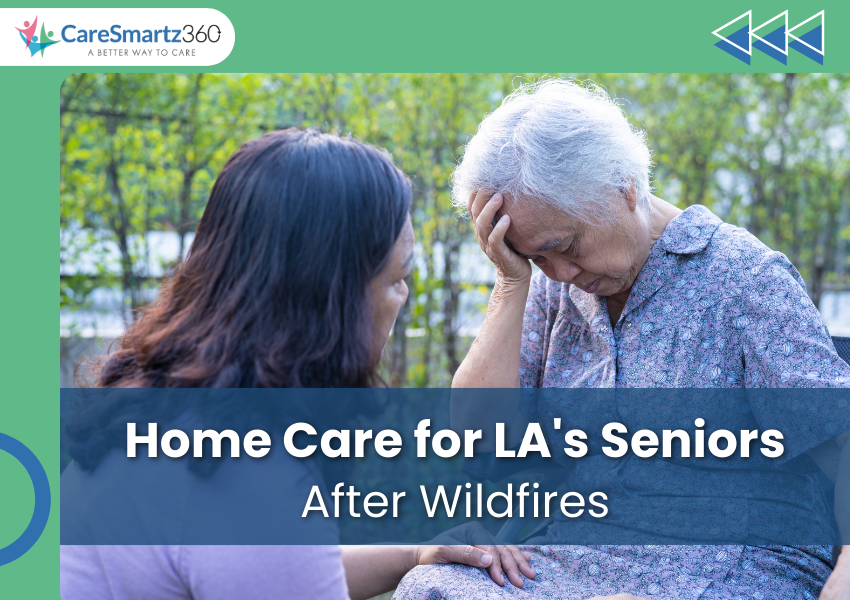
The recent wildfires in Los Angeles have not only left physical scars but have also deeply affected the mental and emotional well-being of the LA community, especially the seniors. It’s a tough time, and it’s normal to feel overwhelmed.
This blog offers support and practical strategies for navigating the recovery process, ensuring that seniors receive the care and support they need to heal and rebuild their lives.
Natural disasters like wildfires can trigger a range of intense emotions. Residents would have experienced shock, grief, anxiety, or even survivor’s guilt. It’s important to recognize that these feelings are normal responses to abnormal events.
“Wildfires and other natural disasters induce terror in ways other life stressors can’t,” says Kyler Shumway, PsyD, licensed psychologist and TEDx speaker. Our brains are wired to protect us during crises, but sometimes, it takes time for our nervous systems to recalibrate. – Wellandgood
According to Dana Rose Garfin, a psychologist at UCLA, these events are a “collective trauma” impacting residents both directly and indirectly, leading to potential PTSD, anxiety, depression, and difficulties in daily functioning. Acknowledging these psychological impacts is the first step toward recovery. – Newsroom.ucla
Immediate Steps to Take |
Description |
|---|---|
| Ensure safety | Provide a calm and stable environment, especially when assisting a senior. |
| Validate feelings | Listen without offering solutions; sometimes, just being heard is the most powerful support. |
| Offer practical help | Assist with finding shelter, food, or reconnecting with loved ones. |
| Encourage connection | Trauma thrives in isolation—encourage reaching out to family, friends, or support groups. |
Recovery is a marathon, not a sprint. Here are some strategies and local resources to support long-term healing:
Many LA-based therapists specialize in trauma recovery, offering therapies like EMDR (Eye Movement Desensitization and Reprocessing) or TF-CBT (Trauma-Focused Cognitive Behavioral Therapy). The Los Angeles County Department of Mental Health (LACDMH) provides free or low-cost therapy services. Call their 24/7 Help Line at 1-800-854-7771 for immediate assistance.
Joining guided classes for relaxation and stress relief is helpful. Deep breathing techniques can help regulate the nervous system and bring a sense of calm.
Establishing small daily rituals can provide a sense of normalcy. Reflect on past hardships you’ve overcome and remind yourself of your resilience. Further, get involved in community efforts—rebuilding together fosters a sense of purpose.

Keep doors and windows closed during poor air quality and use air purifiers or HVAC systems with filters. Avoid smoking, burning candles, or frying food without ventilation. If outdoors, wear an N95 mask.
When cleaning debris, wear N95 masks, gloves, and booties. Ensure the area is screened for hazardous materials by first responders. The Los Angeles County Department of Public Health can provide personal protective equipment kits.
A word by the expert
When returning to burn areas, be aware of potential hazards in the environment. “You’re going into what is still currently considered a hazardous waste zone, so you have to take proper precautions,” says Michael Jerrett.
Air pollution from wildfires affects human health through three major pathways, said Michael Jerrett, the Jonathan Fielding Chair in Climate Change and Public Health – Newsroom.ucla
It can interfere with signaling from the autonomic nervous system to the cardiovascular system, potentially dysregulating heart rate. This can lead to increased risk of atrial fibrillation and heart attacks, he said.
It can cause inflammation in the lungs that spills over into other organ systems, including the heart and the brain. And inhaling very small particles can bypass the body’s natural defenses, going directly into the bloodstream where, he said, they can “threaten every organ system in the body.”
Studies show that pregnant people exposed to more days of wildfire smoke were more likely to have adverse pre-term birth outcomes than those exposed to fewer smoky days.
Jerrett was a co-author of a study published in 2024 that found that more than 50,000 deaths were attributable to California wildfire pollution between 2008 and 2018. Another study found that wildfire exposure led to an increase in incident dementia.
If the home is still standing, check for smoke penetration. Engage a registered industrial hygienist to evaluate the property if there is evidence of smoke damage.
In times of disaster, community is everything. As journalist Eleisha Foon notes, “Those who have chosen to stay are dusting off the ashes, linking arms and looking outside of their own lives.” – RNZ.CO
Los Angeles has faced the flames, and in their wake, the city has ignited a spark of compassion that transcends individual lives. This crisis has served as a poignant reminder that humanity triumphs over materialism, urging us to extend our hands to those in need.
Now, as this vibrant city of dreamers, creatives, and storytellers begins its journey of reconstruction, it stands at a pivotal moment. Like a phoenix rising from the ashes, Los Angeles has a unique opportunity to emerge stronger and more unified.
Healing from the wildfires will be a journey with ups and downs. What matters most is that we support each other and ensure our seniors receive the care they need. By implementing these strategies and utilizing available resources, we can help our community rebuild and heal.
With the 2028 Summer Olympics on the horizon, the city can harness this renewed hope and showcase its resilience to the world. Together, let us watch as Los Angeles transforms challenges into triumphs, proving that from adversity, beauty can blossom anew.
Our users reported 95% customer satisfaction in 2024. Schedule a personal walkthrough to see CareSmartz360 in action.